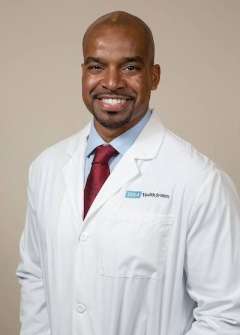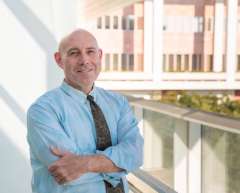Justice Equity Diversity and Inclusion
UCLA Urology: Mission Statement
To improve urological health and health care, we seek to create world leaders in health and medicine, discover the basis for wellness and cures for urological disease, foster a culture of justice, equity, diversity, and inclusion, cultivate community partnerships, and heal humankind one patient at a time.
UCLA Urology: Being a Part of the Solution

Stanley K. Frencher, MD, MPH, Associate Professor of UCLA Urology and Director of Urology and Chair of Perioperative Services Department at Martin Luther King, Jr. Community Hospital (MLKCH), has been named the UCLA Urology Director of Justice, Equity, Diversity and Inclusion (JEDI). Dr. Frencher, along with Dr. Jesse Mills, leads the department's Task Force on JEDI that includes more than a dozen staff, resident physicians, fellows and faculty members.
The mission of the Task Force is to dismantle racist policy, engage in honest conversation, identify challenges and implement recommendations to foster a culture in which diversity, equity, inclusion, and social justice become the fabric of the department.
The Task Force has identified five priority areas to create a culture of inclusion within our department and the broader community that we serve: 1) representation, 2) awareness and understanding, 3) education and training, 4) equity in care delivery and 5) pipeline programs and community engagement.
UCLA Urology has long worked to promote justice, equity, diversity, and inclusion in our faculty and training programs, to bring high-quality care to traditionally underserved communities, and to right the health care injustices and inequities that persist.
Message from the UCLA Urology Chair

In 1966, Dr. Martin Luther King, Jr., declared: “Of all the forms of inequality, injustice in health care is the most shocking and inhumane.” More than 50 years later, our society has arrived at a moment that was long overdue even when Dr. King made that observation: a reckoning with the toxic effects of centuries of systemic racism, including ongoing injustices in health care.
UCLA Urology has long worked to promote justice, equity, diversity, and inclusion in our faculty and training programs, and to bring high-quality care to traditionally underserved communities. And we must continue to work to right the injustices and inequities that persist in health care. In the United States, the legacy of systemic racism in sectors such as education, housing, and employment means that Black, Indigenous, and people of color are more likely to experience reduced access to health care and poorer health. Within the larger health system, insufficient diversity among providers compromises the quality of care. Studies have shown that we all harbor implicit biases that can influence our care. As racial and ethnic disparities in health outcomes persist, we must act urgently to address the causes.
UCLA Urology has embodied the values of justice, equity, diversity, and inclusion for many years, but as long as these problems remain, we must look inward and determine how we can do better. That process is ongoing. It’s not an undertaking we will one day complete; rather, it will always be part of the fabric of our department, embedded in all that we do. It involves rooting out overt and covert forms of discrimination, as well as dismantling the systemic factors that perpetuate inequities. It involves pursuing diversity not merely as a matter of justice, but to improve quality. And it means continuing to venture well beyond the confines of Westwood and Santa Monica to bring our state-of-the-art care to communities that UCLA hasn’t always reached. We are proud of the high-quality services UCLA Urology provides at our affiliate institutions in some of the most underserved areas of Los Angeles. Our goal is to become even more active participants and collaborators with these institutions to improve care and promote social justice, with the recognition that we all have much to learn, and that out of these interactions we will all become better practitioners.
We recognize that as an individual urology department, we can’t solve the entire societal scourge of systemic racism. But we also recognize our power to make a difference. In the words of cultural anthropologist Margaret Mead: “Never doubt that a small group of thoughtful, committed citizens can change the world. Indeed, it is the only thing that ever has.”
Mark S. Litwin, MD, MPH